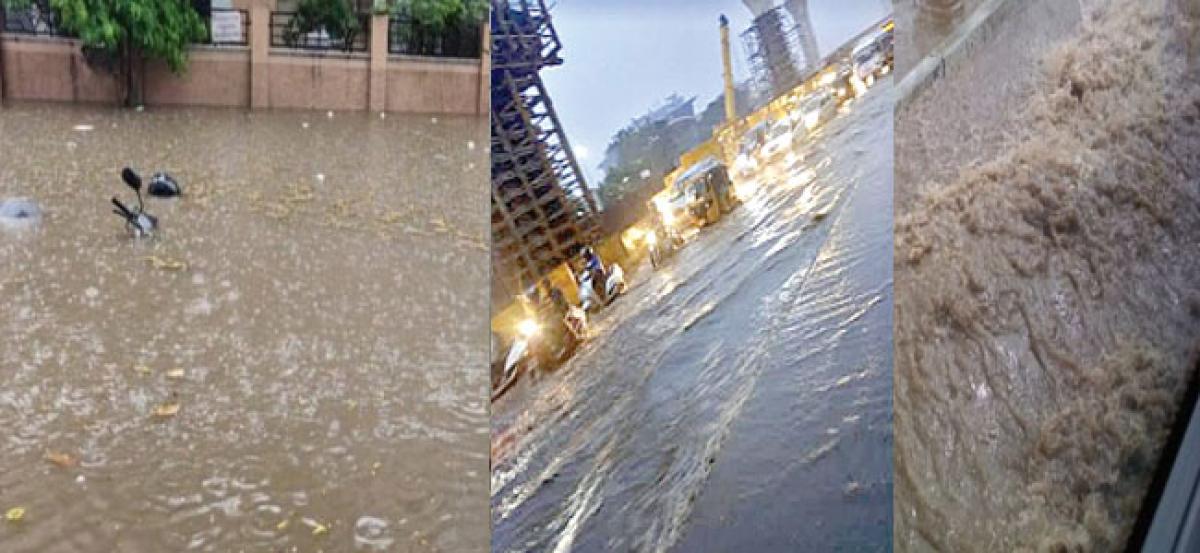Live
- Mohan Babu should immediately issue a public apology: Press Club President Balavardhan
- Strict Protocols Set for Group 2 Exams in Wanaparthy District
- Delhi Police busts gang involved in cable theft on Delhi Metro Blue Line
- MP's Gita recitation programme finds place in Guinness World Records
- Pawan Kalyan Shines Globally as 2nd Most Googled Actor of 2024 Amid Busy Film, Political Career
- Disruptor of House is the chairman himself: Cong and INDIA bloc’s pointed remarks on No-trust notice
- IIIT-Bangalore to host computer vision conference ICVGIP 2024
- F1: Fernando Alonso ‘still dreaming’ of third world championship
- WI vs Bangladesh Watch Controversial Banter Between Shakib and King
- EFLU Celebrates Bharatiya Bhasha Diwas
Just In

x
Highlights
4.6 billion years ago, 70% of earth had been blessed with water leading to it’s current name, the ‘blue planet’. Water is fundamental in sustaining lives and continues to be the need of every organism.
4.6 billion years ago, 70% of earth had been blessed with water leading to it’s current name, the ‘blue planet’. Water is fundamental in sustaining lives and continues to be the need of every organism.
It is interesting to know that the amount of water on earth now as what it was aeons ago. Why is the term ‘depletion’ heard so often then? It is because, the ratio of water being used to water being clean is imbalanced
conservation
Role of Nature
- Planting of trees leads to water being produced as a result of photosynthesis. They also help in reducing the speed of water and thus reducing floods.
- Floodplains are an integral part of healthy rivers and floods are a natural occurrence on rivers. Natural floodplains provide many us with clean water supplies.
- Using soil moisture, wetlands and groundwater recharging to store water leading the water table being balanced.
- Organic growth of crops leads to lesser pollution of water and hence lesser filtration required.
- Protected wetlands provide a natural method to filter water.
Residential Places
- Checking for water leaks and getting them fixed immediately.
- Letting utensils soak in still water in a sink rather than using running water to get rid of food.
- Use low flow flushing or high-efficient flushing system to conserve water in toilet.
- Adopt rainwater harvesting in your house and use collected rain water for other use.
- Instead of using running water, thaw frozen foods in the refrigerator.
Society
- Monitor the water bills for unusually high use.
- Use dual piping one pipe for drinking, bathing and utensil cleaning where other pipe will bring in rain water and treated water for toilet, lawns etc.
- Set a small area of ground aside for composting which can utilise rain or harvested water for growing plants.
- Make sure the roads are even to avoid stagnation of water and a proper drainage system to use the same.
- Encourage cooks to reuse the water used to boil vegetables.
Industries
- Modify the equipment or installing water saving devices or replacing the same with water efficient equipment.
- Give recognition to those who initiate water-efficiency procedures and processes.
- Finding ways to reuse water and recycle it.
- Treating the water and letting it cool down before being released into nearby streams.
- Replacing cleaning methods with equipment that does not require
Individuals
- Reduce the number of times you take a shower.
- Turn the tap off while brushing or lathering your hands with soap.
- Keep the speed of water low while using the faucet.
- Try to maximise the amount of times you can reuse utensils or clothes before washing keeping hygiene in mind.
- Place trash cans in bathrooms to avoid flushing things like tissue papers.
Schools
- Taking water bottles to school. At the end of the day, any leftover water can be poured onto the garden.
- Forming clubs to spread awareness among the more ignorant.
- Put signs near the basins to remind students to turn off taps as soon as they wash their hands.
- Always use a broom to clean walkways, driveways, and entrances rather than hosing off these areas.
- Set up a tank of water for students and teachers that they can use to store unused water which can be consumed later.
Interesting Facts
- By the time a shower reaches 5 minutes, 200 litres of water have already been used.
- There is more water in the atmosphere than in all of our rivers combined.
- Much more fresh water is stored under the ground in aquifers than on the earth’s surface.
- The weight a person loses directly after intense physical activity is weight from water, not fat.
- Water expands by 9% when it freezes.
- A person can live about a month without food, but only about a week without water
- Human bones are 31% water.
Long-term effects of wasting water
- It leads to the extraction from various sources thus disturbing the ground water table.
- Heavy consumption of fresh water in residential complexes or industries leads to scarcity of water for aquatic animals and agricultural house.
- The production of drinkable water is a long process and requires non-renewable fossil fuels. Wasting water means an increase the amount of water being filtered and thus an increased accumulation of the harmful by-products in the atmosphere.
- Famines and droughts will ravage in all countries hence leading to difficult financial and health situations for all.
- Precipitation in the water cycle is necessary, with no proper water to evaporate the precipitation decreases leading to temperature rises and droughts. Pollution of water leads to dangerous precipitation, if any.
By Hafsaa Hussaini
More On

Next Story
More Stories
ADVERTISEMENT
© 2024 Hyderabad Media House Limited/The Hans India. All rights reserved. Powered by hocalwire.com







